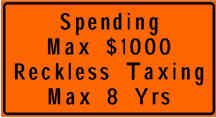 What is fair taxation? It is taxation where every person pays his fair share,
according to his ability to pay:
What is fair taxation? It is taxation where every person pays his fair share,
according to his ability to pay: What is fair taxation? It is taxation where every person pays his fair share,
according to his ability to pay:
What is fair taxation? It is taxation where every person pays his fair share,
according to his ability to pay:
A fair tax does not tax the poor or the retired.
Under the current tax systems, the poor are taxed by Social Security, Medicare, Income, Property, and Sales taxes. And greedy governments now tax pensions. Under a fair tax, the person would be taxed only when he buys new nonessential items.
A fair tax can't be used to target certain groups of people.
A sales tax on all new nonessential items can't target certain groups, because legislators do not know who will buy those items.
A fair tax doesn't identify the taxpayer.
Our system of tax returns, tax identification numbers, and cross-checking is the major cause of identity theft. Removing tax ID numbers and relying on sales prevents this problem. It also prevents the legislature from targeting certain groups of people by using IDs.
Note that this requires the tax to be collected by the state the seller is in, not the state the buyer lives in. Attempting to collect taxes for the buyer's state identifies the taxpayer.
Any taxation over 10 percent causes the economy to get smaller, causing unemployment and poverty. Any legislator who demands more money should be automatically thrown out of the legislature.
No tax money is spent on nonessentials.
Too many legislators want to spend money on things that are nice, but not necessary. Examples include forms of entertainment, sports and recreation facilities and programs, and the arts. None of these is in any way necessary spending. Such spending must be constitutionally prohibited, or funded through donation or user fees.
No hidden taxation is passed on in product prices.
The current system hides all business taxes in the product prices, passing them on to consumers. A fair tax would be collected by retailers, but would not be taxes on businesses themselves.
Note to those who want businesses to bear the brunt of taxation: It is impossible to do that. Taxes on businesses must always be passed on to consumers, because that is where the money to pay the tax comes from.
Nobody who can afford to pay can escape taxation.
Taxing all new nonessential products means that those people who can afford the finer things of life will pay the tax when they buy these things. Those who cannot afford them can still get used items without paying the tax.
A fair tax is constitutionally defined, so lawmakers can't change it.
This keeps the greedy lawmakers who what to create their megalomaniac programs from doing so. Those programs, although intended to help the poor, usually end up hurting them.
A fair tax provides for voluntary funding of special projects.
For those nonessential programs that only government can provide, funding mechanism that either charge users of the programs for the services provided or allow people to donate should be in place. An example is a motor fuel tax for the use of the highways, with the revenue usable for only the construction and maintenance of highways.
A fair tax doesn't penalize former prosperity.
Property taxes and inheritance taxes are very wrong in this respect, because they charge a retired person or who keeps his home, or the heir who inherits it, at the rate the owner could afford when he was working, and when he bought the home. Taxes should never tax someone for former prosperity, or for current possessions.
LINKS: